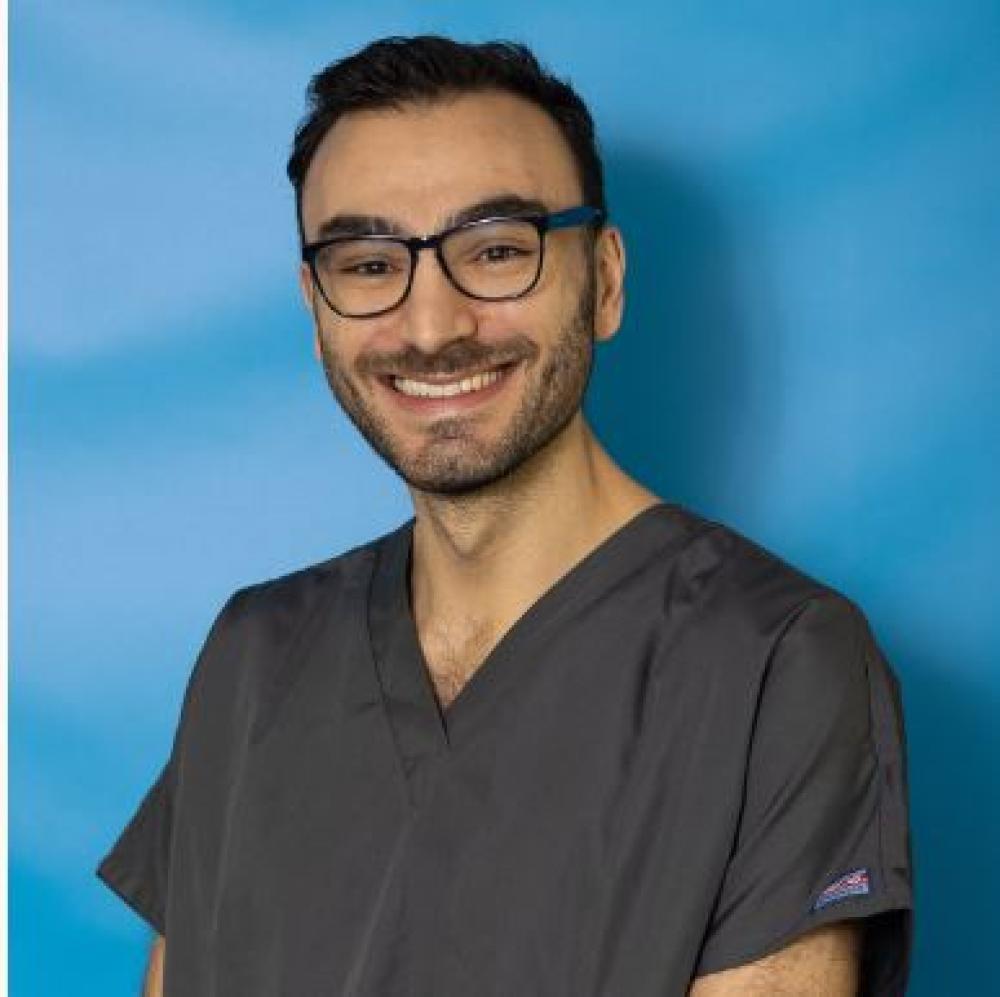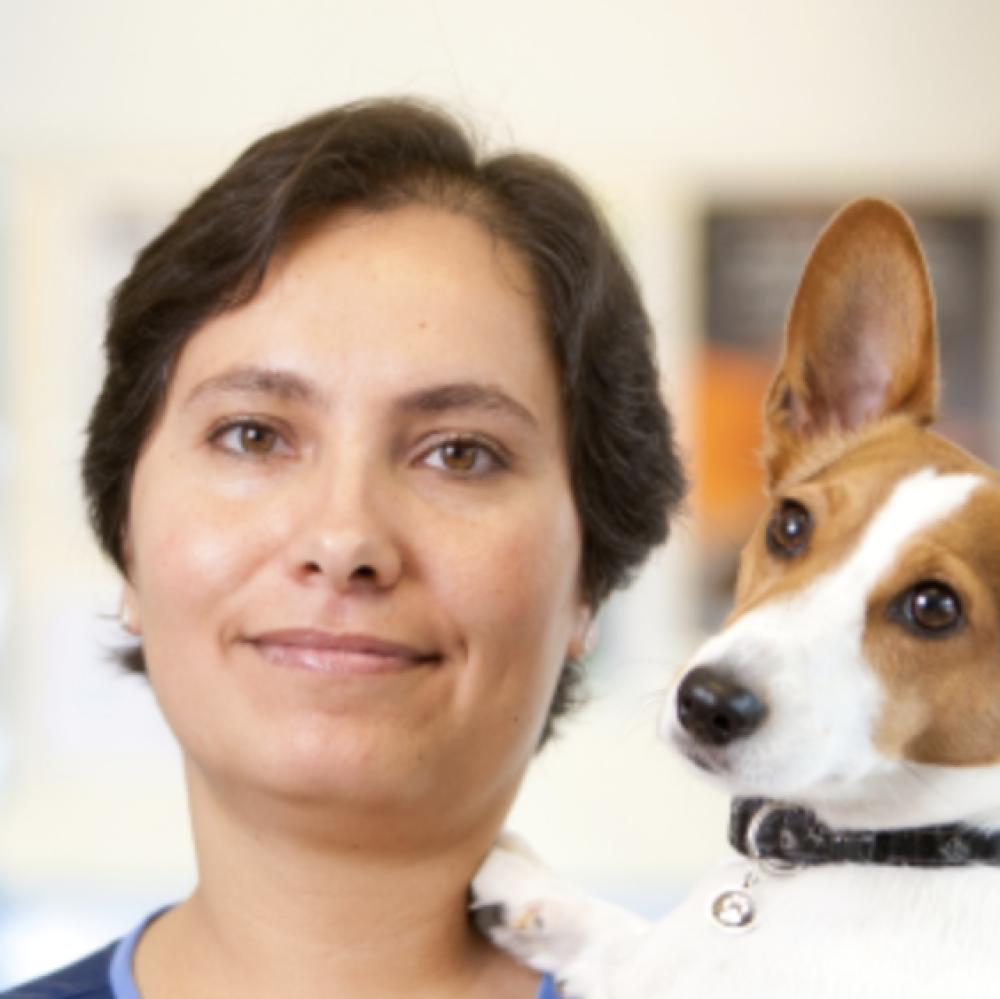This highly popular small animal medicine programme will enhance your skills by providing a comprehensive and structured approach to diagnosing and managing internal medicine cases.
Join thousands of veterinary professionals worldwide who have invested in their careers and developed their confidence, knowledge and skills to give the best care to their patients.
This programme covers the main canine and feline body systems such as clinical pathology and cytology, diagnostic imaging, respiratory, cardiovascular medicine, gastroenterology, emergency medicine and critical care and so much more.
By gaining additional knowledge in these areas, you will elevate your skills and deliver optimal care to small animal patients in your practice with the following benefits:
-
Develop expertise in diagnosing and managing internal medicine cases
-
Foster reflective practice and improve problem-solving abilities
-
Create a clear and logical approach to clinical problems
-
Broaden your knowledge base in small animal medicine
-
Improve productivity with expedient and accurate diagnoses
-
Enhance service value and client satisfaction
-
Increase confidence in tackling small animal medical cases
-
Sharpen interpretation skills for effective diagnoses
Hear what our delegates have to say
Don’t just take our word for it - our delegate feedback speaks for itself.
Key features of this programme
Expert Speakers
Leading experts in a variety of clinical topics delivering the latest content and who will guide you throughout the programme
Different learning options
This programme is delivered face to face or in an online format providing flexibility to tailor the course to your preferred learning style
Reflective learning
In addition to the taught modules, you will receive pre- and post-module questions to help you reflect and track your learning. This approach to reflective learning will assist you throughout your career as a veterinary professional
Modules
15 theoretical modules and 6 practical modules, delivered monthly to minimise time away from practice
World-leading online learning resources
- A copy of the Improve International Manual of Clinical Small Animal Internal Medicine, Volumes 1 and 2
- Online forum for peer discussion
- Module notes, reading lists and papers
- Access to Harper Adams Library once registered for the PgC
Latest clinical training environments
Convenient and state-of-the-art training and practical facility with the latest equipment in Swindon
Assessments and exams
All assessments and exam fees are included
Programme support
Dedicated support will ensure you have all the right tools and information to support you from the start of your programme to the moment you receive your qualification
Expert Speakers
Leading experts in a variety of clinical topics delivering the latest content and who will guide you throughout the programme
Different learning options
This programme is delivered face to face or in an online format providing flexibility to tailor the course to your preferred learning style
Reflective learning
In addition to the taught modules, you will receive pre- and post-module questions to help you reflect and track your learning. This approach to reflective learning will assist you throughout your career as a veterinary professional
Modules
15 theoretical modules and 6 practical modules, delivered monthly to minimise time away from practice
World-leading online learning resources
- A copy of the Improve International Manual of Clinical Small Animal Internal Medicine, Volumes 1 and 2
- Online forum for peer discussion
- Module notes, reading lists and papers
- Access to Harper Adams Library once registered for the PgC
Latest clinical training environments
Convenient and state-of-the-art training and practical facility with the latest equipment in Swindon
Assessments and exams
All assessments and exam fees are included
Programme support
Dedicated support will ensure you have all the right tools and information to support you from the start of your programme to the moment you receive your qualification
Programme details
Module Summary
01 - Clinical Pathology and Laboratory Medicine
Key learning objectives:
- Understand the rationale behind selection of appropriate tests for your patients
- Consider the different sampling techniques, sample processing and identify factors that may affect them
- Become familiar with the clinical pathology of hepatobiliary and renal disease
- Structure your approach to anaemia to differentiate between non-regenerative and regenerative types before determining possible underlying causes
- Transform your understanding of haemostasis to enable you to determine when, why and how it goes wrong
- Use your knowledge to interpret laboratory data from clinical patients to help you prioritise further investigations
- Develop your haematological skills by becoming adept at interpreting both normal and abnormal haemograms, identifying reticulocytes and discovering platelet and white cell abnormalities
- Improve your approach to patients with neutropaenia and marked leucocytosis
02 - Cytology
Key learning objectives:
- Understand the principles and practical aspects of cytological sample collection, storage and preparation
- Maximise the value of your microscopy skills
- Perfect your ability to describe the principles of routine cytological examination and how this informs a cytological diagnosis
- Transform your understanding of the different cytological characteristics of effusions, aspirates and lavage samples
- Familiarise yourself with some of the conditions most commonly diagnosed by cytology
03 - Diagnostic Imaging
Key learning objectives:
- Review the principles of radiography, radiology and the significance of radiation protection
- Appreciate the use of contrast radiography in a variety of situations and using a variety of techniques
- Understand the principles of ultrasound imaging
- Familiarise yourself with the basic principles of advanced imaging
- Compare and contrast CT and MRI as diagnostic tools
04 - Diagnostic Imaging Practical Film Reading and Abdominal Ultrasound
This practical day will include:
- Case based discussion
- Film reading session
- Practical abdominal ultrasound scanning
Key learning objectives:
- Develop your ability to critique radiographs
- Enhance your skills in interpreting radiographs in a systematic and thorough manner
- Practice your ultrasound imaging skills to help you to differentiate between normal and abnormal abdominal structures
05 - Respiratory disease
Delivered online through our Moodle platform supported by the module tutor/speaker
Key learning objectives:
- Improve your understanding of the importance of a detailed and thorough physical examination
- Integrate a dyspnoea algorithm into your investigations of respiratory disease
- Develop an understanding of the importance of diagnostic aids in the investigation of respiratory disease: radiography; endoscopy; ultrasonography and cytology
- Consolidate your knowledge of upper and lower airway disease, parenchymal and pleural space disease
- Familiarise yourself with the principles of primary and ancillary respiratory therapeutics
- Learn the best approach to the acute management of the dyspnoeic patient
06 - Cardiovascular Medicine I
Key learning objectives:
- Extend your understanding of the principles and importance of a physical examination in patients with suspected cardiac disease
- Familiarise yourself with the principles of electrocardiography
- Integrate your understanding of the approach to electrocardiographic interpretation to help you identify common arrhythmias
- Improve your evaluation of thoracic radiographs in reference to cardiac patients
- Understand the basic principles of echocardiography and its role in diagnosis of cardiac disease
07 - Cardiovascular Medicine II
Key learning objectives:
- Recognise and understand the events involved in the pathophysiology of cardiac failure
- Define systolic and diastolic failure
- Appreciate the species differences in prevalence of congenital and acquired cardiac diseases
- Describe the major congenital cardiac diseases in dogs and cats
- Transform your understanding of the pathophysiology, diagnosis and management of acquired valvular, myocardial and pericardial diseases
- Familiarise yourself with the therapeutic options and their applications in patients with cardiac disease
- Learn how to manage emergency cardiac patients for improved outcomes
08 - Gastroenterology I
Key learning objectives:
- Develop your understanding of deglutition and dysphagia
- Familiarise yourself with the pathophysiology of:
- Regurgitation
- Acute and chronic vomiting
- Diarrhoea
- Enhance your diagnostic approach to gastrointestinal abnormalities
- Describe the principles and basic use of endoscopy in the diagnosis of gastrointestinal disease and when it is indicated
09 - Gastroenterology II
Key learning objectives:
- Improve your understanding of the pathophysiology of hepatic and hepatobiliary disease
- Devise a systematic diagnostic approach to the jaundiced patient
- Perfect your investigative approach to suspected hepatobiliary disease
- Understand the pathophysiology of exocrine pancreatic disease
- Describe the investigative approach to acute and chronic exocrine pancreatic diseases
- Discuss the therapeutic options in hepatobiliary and pancreatic diseases
10 - Immunology
Delivered online through our Moodle platform supported by the module tutor/speaker.
Key learning objectives:
- Learn the basis of immune function and the immune response to better understand the pathophysiology of immune-mediated disease
- Develop your diagnostic approach to common immune-mediated diseases in small animals
- Transform your understanding of the basis of therapy for immune-mediated diseases
- Discuss the use of common immunosuppressive therapies
11 - Emergency Medicine and Critical Care
Key learning objectives:
- Familiarise yourself with a thorough and systematic approach to the assessment of the critically ill patient’s major body systems
- Enhance your understanding of the minimum database and its’ interpretation
- Implement your assessment of your patients when considering their fluid, electrolyte and transfusion requirements
- Understand the principles and practical aspects of critical patient monitoring
- Recognise imminent cardiopulmonary arrest more promptly
- Learn how to select and apply both basic and advanced life support
This module includes a practical session where the following techniques will be reviewed:
- Placing a tracheostomy tube
- Thoracocentesis
- Chest drain placement and appropriate management
12 - Endocrinology I
Key learning objectives:
- Get to grips with the underlying principles of endocrine anatomy, physiology and pathophysiology
- Become familiar with the clinical signs and diagnostic approaches in cats and dogs with endocrine disorders such as:
- Hypo and hyperadrenocorticism – common and uncommon presentations
- Hypo and hyperthyroidism
- Primary and Secondary hyperparathyroidism
- Understand the basis of medical and (where appropriate) surgical management for diseases affecting the adrenal, thyroid and parathyroid glands
13 - Endocrinology II
Key learning objectives:
- Demonstrate an understanding of the pathophysiology and clinical signs associated with endocrine pancreatic disease including insulinoma
- Describe the investigation and management of diabetes mellitus and diabetic ketoacidosis in the dog and cat
- Get to grips with understanding the causes of failure to control diabetes and the approach to the unstable diabetic patient
- Understand the pathophysiology of pituitary endocrine diseases
- Become familiar with the clinical signs, investigation and management of pituitary endocrine disease in the dog and cat
14 - Medical Oncology
Delivered online through our Moodle platform supported by the module tutor/speaker
Key learning objectives:
- Be able to understand the principles of tumour biology and staging
- Formulate a general investigative approach to the cancer patient
- Develop your understanding of chemotherapy, radiotherapy and surgical oncology
- Familiarise yourself with the therapeutic management of common canine and feline neoplasms
- Enable yourself to recognise and manage common oncologic emergencies
15 - Dermatology
Key learning objectives:
- Develop a problem-solving approach to skin diseases
- Describe the steps involved in dermatologic examination in cats and dogs
- List and understand the techniques used for the laboratory investigation of skin disease and when they should be used
- Recommend a rational problem-solving approach to the investigation and treatment of :
- Alopecia
- Pruritus
- Become familiar with the common presentations of bacterial, parasitic and fungal skin disease
- Identify common dermatologic manifestations of systemic disease and their pathogenesis
16 - Medical Neurology
Key learning objectives:
- Revise your understanding of the principles of functional neuroanatomy
- Become adept at a thorough and systematic neurologic examination to help you localise lesions
- List and understand further diagnostic techniques available to investigate neurologic disease
- Consider the investigation and management of common neurologic syndromes
- Understand the steps involved in the investigation into the aetiology of seizures in dogs and cats
- Improve your ability to manage seizures in an emergency and longer term.
17 - Urology I
Key learning objectives:
- Understand the diagnostic techniques available to investigate urinary disease
- Delve into the detail of the pathophysiology of acute and chronic renal failure, glomerular disease and proteinuria
- Develop your investigative approach into renal disease
- Improve your therapeutic management of such cases
18 - Urology II
Key learning objectives:
- Describe and understand the factors involved in the development of crystalluria and urolithiasis in cats and dogs
- Understand the principles of management of lower urinary tract disease in cats and dogs
- Explore the often complicated management of FLUTD and urethral obstruction
- Examine the possible causes of urinary incontinence, their diagnosis and management
- Classify canine prostatic diseases and understand their pathogenesis, diagnosis and medical management
19 - Canine Infectious Disease
Delivered online through our Moodle platform supported by the module tutor/speaker
Key learning objectives:
- Compile a list of the major infectious diseases in dogs and cats
- Describe the diagnosis and management of common infectious diseases in dogs and cats
- Familiarise yourself with the clinical signs of significant imported diseases occurring in dogs and cats
- Understand the principles of vaccination and vaccination regimes
- Learn the steps involved in the pet travel scheme
- List notifiable diseases in dogs and cats
20 - Feline Infectious Disease
Approach the pathophysiology, diagnosis and, where appropriate, treatment and management of common viral diseases in cats including FeLV, FIV and FIP and respiratory infections.
- Diagnose and treat Haemoplasma infections
- Explain the diseases of hunting cats including toxoplasmosis, pox virus, mycobacterial disease and salmonellosis
- Approach enteric infections of the cat including protozoal disease (Trichomonas foetus, Cryptosporidium, Giardia and Isospora) and bacterial/viral disease
- Understand fungal mycoses
- Control infectious and zoonotic disease in the home, clinic, shelters and cattery situations
21 - Ophthalmology
Key learning objectives:
- Perfect your ability to perform common ophthalmic examination techniques:
- Basic neuro-ophthalmological examination
- Ophthalmoscopy: Distant Direct; Close Direct & Indirect
- Correct use of Fluoroscein for corneal evaluation
- Tonometry & Gonioscopy
- Get to grips with current ocular therapeutics: what do you need to have on your pharmacy shelf?
- Familiarise yourself with the medical management of common ocular conditions
- Identify the ocular manifestations of systemic diseases
- Be able to recognise common ocular conditions that require surgery
Qualifications
General Practitioner Certificate (GPCert)
This course is accredited by ISVPS and allows you to achieve a General Practitioner Certificate
Postgraduate Certificate (PgC)

By attending the full structured taught programme and following successful assessment, you can gain the ISVPS General Practitioner Certificate (GPCert) awarded by the International School of Veterinary Postgraduate Studies (ISVPS) and the Postgraduate Certificate (PgC) from Harper Adams University (HAU).
Postgraduate Certificate (PgC)
The PgC represents Masters Level 7 within the Quality Assurance Agency’s framework for higher and further education. It provides 60 transferable academic credits towards the 180 required for a Master's degree in the UK or 30 ECTS credits (Europe).
On successful attainment, you will also be awarded the GPCert(SAM) and a personalised certificate, and your name will be included in the ISVPS register of General Practitioner Certificate holders.
RCVS Advanced Practitioner Status
After completing your Postgraduate Certificate, you can apply for the RCVS Advanced Practitioner Status. This is subject to meeting all of the other entry requirements set out by the RCVS in the Applicant Guidance Notes. You will also need to provide evidence of Key Professional Skills knowledge to the RCVS when applying for the Advanced Practitioner Status.
General Practitioner Advanced Certificate (GPAdvCert) and Master's Degree
By continuing your learning journey with us, your PgC may also be used towards an ISVPS GPAdvCert or a Professional Master's degree (pending validation) with Harper Adams University. These qualifications will enable you to expand your knowledge and further demonstrate your skills while obtaining academic recognition.
Speakers
Pricing
Pricing Billing
Small Animal Medicine
Payment Terms & Conditions
Registration Information
100% Satisfaction
We're completely confident in the quality of our training and CPD. So much so that if you're not 100% satisfied with your certificate course, we'll give you a 100% refund. Just get in touch with us within 30 days of your start date and we'll sort the rest. T's and C's apply.
Find out moreFAQs
Practical Sessions
Where are practical CPD courses or face-to-face modules held?
What will the timings be for face-to-face certificate modules and practical CPD sessions? How will my day be structured?
Where do the cadavers come from for the practical CPD and surgical modules/courses?
What should I wear to a practical CPD course/module?
I will be travelling from overseas, do I need a Visa?
Will the dogs used for practical CPD courses be sedated?
Will the dogs used for scanning have any abnormalities?
Are the dogs used for ultrasound CPD clipped?
Are cats used for any of the ultrasound courses?
Postgraduate Certificates (PgCs)
Royal College of Veterinary Surgeons (RCVS) Advanced Practitioner (AP) Status – what has the RCVS announced?
What is a Postgraduate Certificate (PgC)?
Am I eligible for the PgC programme?
How do I enrol on the PgC programme?
I have previously achieved a GPCert. Can I still upgrade to a PgC?
Is the PgC equivalent to the RCVS CertAVP, BSAVA PGCert, and other university-awarded veterinary postgraduate certificates?
How are Improve’s PgCs different from other providers?
Will a PgC enable me to apply for the RCVS Advanced Practitioner Status?
How will I be assessed for the PgC?
What does the PgC fee include?
What’s not included in the PgC fee? Do I need to budget for further costs?
Payments & Finance
What payment methods do you accept?
Do you offer any flexible payment plans?
What payment methods can I use for setting up a direct debit?
Do you issue separate invoices for each instalment?
Why was my Direct Debit payment not charged on the day that is established in my payment plan?
Why couldn’t I make payment during check-out?
Where can I find the bank details for the bank/wire transfer?
What happens if my circumstances change and I need to cancel my order?
When is payment for my veterinary CPD course due?
How much do the veterinary CPD courses and certificate programmes cost?
My course includes assessments with HAU, how do I make payment for these?
My CPD course includes assessments with ISVPS, how do I make payment for these?
Can I pay by Direct Debit?
General Practitioner Certificates (GPCerts)
What is the criteria for enrolling in a General Practitioner Certificate programme?
What is the difference between a GPCert and a PgC?
Can I use this veterinary certificate programme towards my veterinary CPD hours?
How long does a General Practitioner Certificate (GPCert) take to achieve?
I want to register for a veterinary certificate course but I may be away for some of the modules. Does this mean I will miss out?
How long do I have to finish the modules for my GPCert?
What resources will be available to support me through the certificate programme?
How long do I have access to the course material for?
How will I be assessed for the GPCert?
What happens if I am not eligible to sit the assessments and/or exam with my cohort?
What does the General Practitioner Certificate programme fee include?
What’s not included in the certificate programme fee? Do I need to budget for further costs?
Will my veterinary postgraduate qualification be recognised in other countries?
Can I take a postgraduate certificate if coming from a non-European country? How do face-to-face modules work?
What is a Postgraduate Certificate (PgC)?
Where are the taught programmes held?
I have previously achieved a GPCert. Can I use this towards a PgC?
Are Improve’s Postgraduate Certificates academically equivalent to the RCVS CertAVP and other postgraduate certificates?
Over what time period can I take the taught modules?
I want to register on a modular course but I may be away for some of the modules. Does this mean I will miss out?
Will Improve’s PgCs enable me to apply for the RCVS Advanced Practitioner Status?
What resources will be available to support me through the PgC?
How are Improve’s PgC programmes different to other providers?
Our Clinical Excellence Centre
Discover the new Improve Veterinary Education Clinical Excellence Centre featuring two surgical wet-lab training theatres and a radiology suite.
Find out more






















